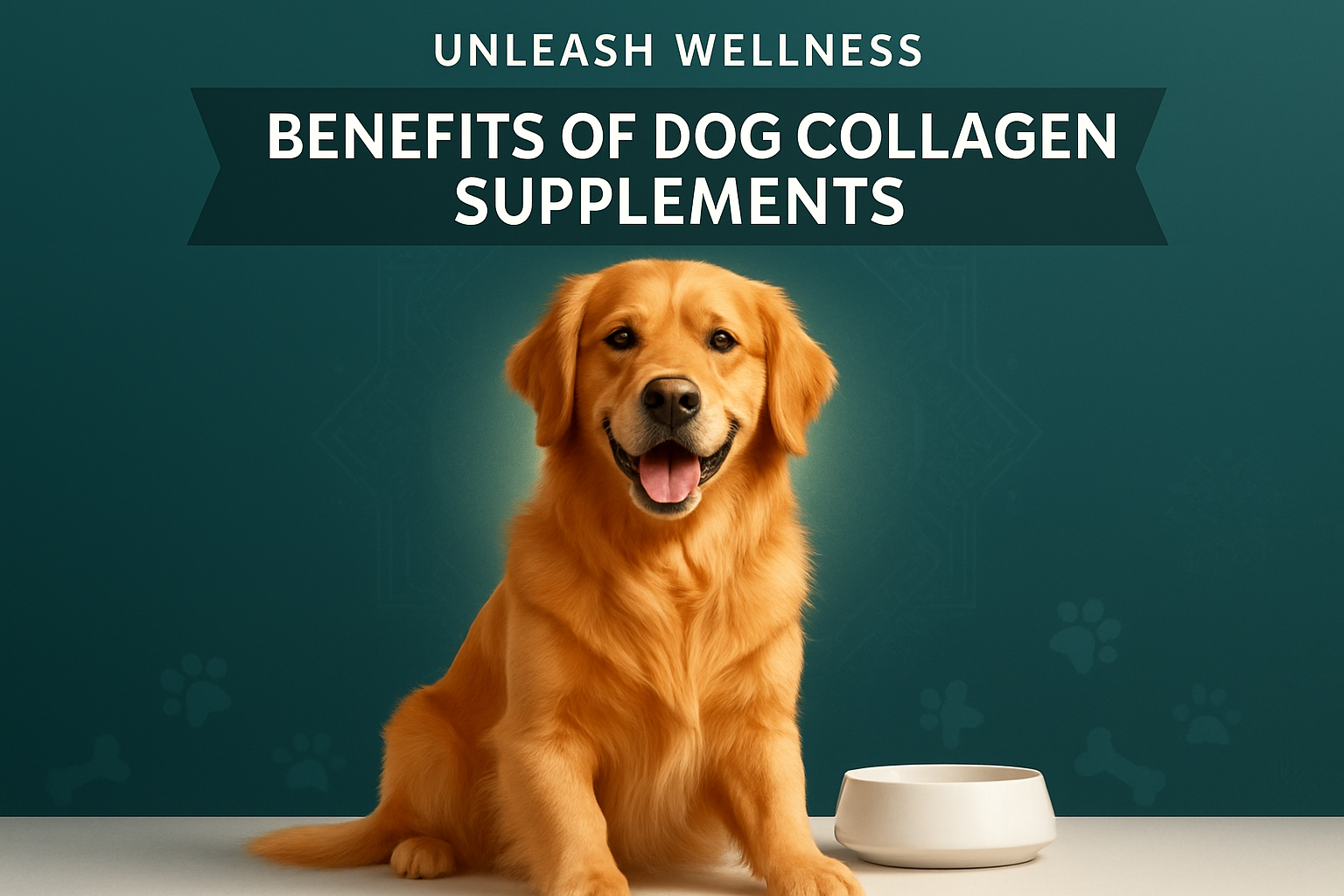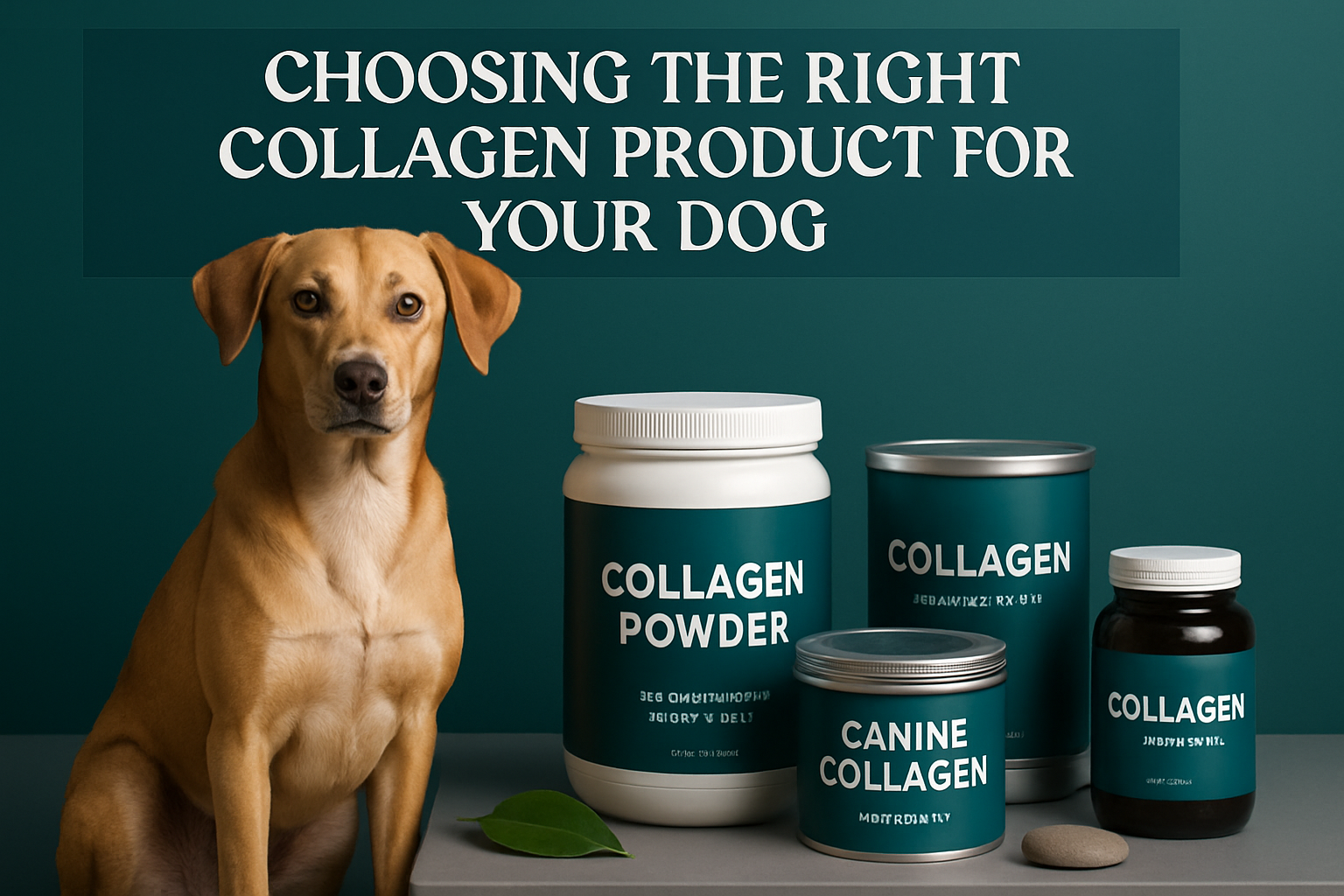As dogs age, their natural production of collagen declines, which may affect joint health, mobility, skin, and coat quality. Collagen is the most abundant protein in a dog's body, forming the foundation for connective tissues. Recent trends show growing interest among pet owners in using collagen supplements to support structural health and wellness in dogs.
What Is Collagen and Why Do Dogs Need It?

Collagen for dogs serves as nature's building block, creating the foundation your furry companion needs to stay active and healthy. This essential protein works behind the scenes to maintain your dog's physical structure and overall wellbeing.
Collagen Forms the Structural Foundation
Think of collagen as your dog's internal scaffolding. This vital protein creates the framework for joints, ligaments, tendons, bones, skin, and cartilage throughout their body. Without adequate collagen, these structures lose their strength and flexibility.
Collagen for dogs acts like the glue that holds everything together. It provides the tensile strength needed for smooth joint movement and maintains the elasticity that keeps skin supple and healthy. This structural support becomes especially important as dogs face daily wear and tear from running, jumping, and playing.
Natural Production Decreases with Age
Your dog's body naturally produces less collagen as they age, similar to humans. This decline typically begins around middle age and accelerates in senior dogs. The reduction in collagen production contributes to joint stiffness, decreased mobility, and that dull coat many older dogs develop.
Pet owners often notice their once-energetic companions struggling with stairs or showing less enthusiasm for walks. These changes frequently stem from diminished collagen levels affecting joint health and overall comfort.
Active Dogs Need Extra Support
Working dogs, athletic breeds, and highly active pets face greater demands on their connective tissues. Collagen for dogs in these categories becomes particularly important for maintaining peak physical performance.
The Indian pet supplement market's projected growth to USD 0.20 billion by 2033 reflects increasing awareness among pet parents about supporting their dogs' active lifestyles. Additional collagen supplementation helps these hardworking companions maintain healthy joints and recover more effectively from intense physical activity.Understanding collagen's role helps explain why targeted supplementation has become increasingly popular among conscientious pet owners seeking natural wellness solutions.
Benefits of Dog Collagen Supplements

Collagen for dogs offers remarkable advantages for your pet's overall health and vitality. More pet parents are discovering how this essential protein transforms their furry companions' well-being from the inside out.
Supporting Joint Health and Mobility
Joint health becomes increasingly important as dogs age, especially for larger breeds prone to mobility issues. Collagen for dogs directly supports cartilage maintenance and joint mobility, making daily activities more comfortable for senior pets and those experiencing joint discomfort. The protein's unique structure helps cushion joints naturally, reducing stiffness and promoting smoother movement.
Active dogs benefit tremendously from consistent collagen supplementation, as it helps maintain the structural integrity of cartilage that bears the brunt of physical activity.
Enhancing Skin and Coat Quality
Your dog's appearance reflects their internal health, and collagen plays a crucial role in maintaining skin elasticity and coat hydration. Regular supplementation with collagen for dogs results in visibly shinier, softer fur and healthier skin conditions. The protein works at the cellular level to improve moisture retention and strengthen hair follicles.
Pet parents often notice improvements in coat texture and reduced skin irritation within weeks of starting collagen supplementation.
Strengthening Digestive Health
The amino acids found in collagen for dogs, particularly glycine and glutamine, provide essential building blocks for gut health. These compounds strengthen the intestinal lining, supporting better nutrient absorption and overall digestive function. A healthy gut contributes to improved immunity and energy levels.
Building Stronger Bones and Connective Tissues
Beyond joints, collagen supports bone density, dental health, and the strength of ligaments and tendons. This comprehensive structural support reduces injury risk and promotes better dental hygiene, contributing to your dog's long-term physical resilience and comfort.
Choosing the Right Collagen Product for Your Dog

The Indian pet supplement market is experiencing remarkable growth, projected to double from USD 0.10 billion in 2024 to USD 0.20 billion by 2033 (IMARC Group)[https://www.imarcgroup.com/india-pet-supplement-market]. With so many collagen for dogs options flooding the market, selecting the right product requires careful consideration of your pet's specific needs and safety standards.
Quality and Safety Standards
When shopping for collagen for dogs, prioritize products specifically formulated for pets. Human collagen supplements often contain ingredients toxic to dogs, including artificial sweeteners like xylitol. Look for products that clearly state "no preservatives, allergens, or artificial additives" on their labels.
Quality manufacturers will provide transparent ingredient lists and third-party testing certificates. Products manufactured in facilities following strict quality control protocols ensure your dog receives pure, safe collagen supplementation without harmful contaminants.
Proper Dosage Guidelines
Size matters significantly when determining collagen dosage for your dog. A 5kg Pomeranian requires vastly different amounts compared to a 40kg German Shepherd. Choose supplements that provide clear, science-based dosing instructions based on your dog's weight.
Reputable brands often include veterinary consultation recommendations or dosing charts developed through clinical research. Start with the manufacturer's lowest recommended dose and monitor your dog's response before adjusting portions.
Source Selection Based on Sensitivities
Collagen for dogs typically comes from three primary sources: bovine (cow), marine (fish), or poultry (chicken). Each offers similar benefits but may trigger different allergic reactions.
Dogs with beef allergies should avoid bovine collagen, while those sensitive to chicken need poultry-free options. Marine collagen works well for dogs with multiple protein sensitivities, though it's often more expensive. Consider your dog's dietary history and known allergies when making your selection.
Quality collagen products will clearly identify their protein source, helping you make informed decisions for your pet's health and comfort.
Safe Usage and What to Expect
Starting collagen for dogs requires careful planning and realistic expectations. Understanding the timeline and safety protocols ensures your dog receives maximum benefits while minimizing potential risks.
Introduce Collagen Supplements Gradually
Slow introduction is key when starting collagen for dogs. Begin with half the recommended dosage for the first week, allowing your dog's digestive system to adapt gradually. Monitor closely for any changes in appetite, stool consistency, or energy levels during this adjustment period.
Watch for behavioral shifts that might indicate sensitivity or intolerance. Some dogs may experience mild digestive upset initially, which typically resolves within 3-5 days. If symptoms persist beyond a week, reduce the dosage further or consult your veterinarian. Remember that each dog responds differently to new supplements, making careful observation essential during the first month.
Timeline for Visible Results
Patience pays off with collagen supplementation. Visible coat improvements typically appear within 4-6 weeks of consistent use, with shinier, softer fur being the first noticeable change. Joint support benefits require longer, usually 8-12 weeks of daily administration before significant mobility improvements become apparent.
The timeline varies based on your dog's age, size, and existing health conditions. Older dogs or those with severe joint issues may need up to 16 weeks to show substantial improvement. Document progress through photos and brief notes about mobility and coat quality to track subtle changes that might otherwise go unnoticed.
Professional Veterinary Guidance
Veterinary consultation is non-negotiable before starting any collagen regimen. This becomes especially critical if your dog takes medications for heart conditions, diabetes, or other chronic health issues. Certain supplements can interact with prescription medications, potentially affecting their effectiveness or causing adverse reactions.
Your veterinarian can recommend appropriate dosages based on your dog's specific needs and health profile. They'll also establish monitoring protocols to ensure the supplement supports rather than complicates existing treatments, maximizing benefits while maintaining your pet's overall health and safety.
Conclusion
Collagen supplements, when used appropriately, can support joint function, coat health, and overall wellness in dogs. Product purity, proper dosing, and veterinary guidance are essential for optimizing safety and outcomes. Collagen offers a balanced, evidence-based supplement option for pet parents looking to address age or activity-related health changes in their dogs.
Consult your veterinarian before adding collagen to your dog's diet, and explore trusted pet-specific collagen supplements to support your dog’s lifelong well-being.




